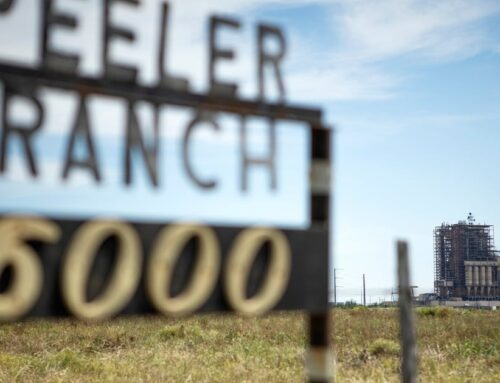The facts about a planet facing climate disaster are clear. Why won’t this Labour government face them?
December 20, 2024
There is no need to overcomplicate things: a rise in global temperatures of 3.1C is not compatible with human survival. That is where we are heading, unless we act now. On our current path, the world will exceed 1.5C of warming, and could reach a rise of 2.6-3.1C by the end of the century.
For you, today, that might make the difference between wearing a jumper or a jacket. For humanity, it is the difference between survival and extinction. Paris and Berlin will bake under heatwaves. New York will be hit by frequent storm-surges. Coastal towns will be submerged; 800 million people are living on land that will be underwater.
More of the tropics and the Gulf will exceed the heat threshold at which the human body can survive. We do not have to look to the future to know the horrors of climate breakdown. It is here, now. According to a study at Monash University, extreme weather can account for 9.4% of all deaths across the globe between 2000 and 2019. In the past year alone, heatwaves have killed 1,500 in Myanmar; flooding has affected more than 700,000 people in east Africa and left more than 400,000 displaced in southern Brazil; and wildfires in Chile have destroyed more than 14,000 homes.
This is on top of catastrophic biodiversity loss; in just 50 years, the world has lost more than two-thirds of its wildlife.
If our political leaders acted out of humanity, the plight of others would be enough to motivate them into action. In the absence of empathy, perhaps we need to be more direct: the climate crisis is coming for you, because it is coming for us all.
Without urgent action, “once-in-a-generation” events – the flooding of New York subways, the typhoon-like winds sucking people out of their apartments in China, the forest fires – will become the new routine of daily life. Politicians abandoned the goal to stop climate breakdown many years ago. We have a much more basic demand: to stop climate breakdown entering a new phase of existential disaster.
That means avoiding certain “tipping points” that would put humanity on an irreversible path to catastrophe. The collapse of the Atlantic meridional overturning circulation, for example, would disrupt the rains that billions of people depend on for food in India, South America and west Africa. Permafrost thaw would generate an irreversible release of carbon dioxide. And the loss of the Greenland ice sheet would result in disastrous runaway melting.
Few politicians deny that human-made global heating is real. Instead, our government peddles a different – more insidious – kind of denialism. One that moves away from a disbelief in the climate crisis, and toward a belief that incremental change can fix it.
The Labour government has already rowed back on its £28bn green investment pledge, cutting it by half and replaced it with blind faith and a £22bn investment in carbon capture. It is a policy that lets the fossil fuel industry carry on destroying our natural world. In unrelated news, the Labour party accepted a £4m donation from a Cayman Islands-registered hedge fund with shares in oil and gas.
This government is not just failing to stand up to fossil fuel giants. It is failing to confront the economic system that empowers them. The richest 1% are responsible for more carbon emissions than the poorest 66%, yet our government still refuses to bring in wealth taxes to reduce inequality. Unless the government has the courage to rewrite the rules of our ecocidal economy, its climate targets will soon become yet another broken promise.
A planet cannot be cooled by warm words; we need fundamental change, now. A Green New Deal would invest in publicly owned renewable energy and water. It would create millions of green jobs. It would promote sustainable farming based on the principles of agroecology. And it would kickstart an economy based on human need, not corporate greed.
The climate emergency is a global problem that requires global solutions. The least this government could do is show some respect for nations that have contributed least to global heating but will suffer the worst effects. When the prime minister said reparations were off the agenda, he wilfully ignored the lasting colonial inequalities putting vulnerable communities at risk of climate disaster. Up against such historical amnesia, is it any wonder that delegations representing smaller nations temporarily exited negotiations at Cop29?
In one respect, the UK is a global leader: cracking down on climate activism. British police arrest environmental protesters at nearly three times the global average – a shocking reflection of an establishment that criminalises those who want to save our natural world while rewarding those intent on destroying it. The government is also trying to win the global race-to-the-bottom over migration.
The prime minister knows what he is doing when he talks of British “open border experiments”. He is fanning the flames of hatred of the kind we saw on the streets last summer. And he is contributing to the demonisation of human beings who are fleeing the very climate crisis he is failing to address.
While marginalised communities are under attack, climate doomism is not an option. As long as there is life on this Earth, there will always be a reason to defend our shared humanity. The future is stark, but it is never too late to build a better, more sustainable world.
-
Jeremy Corbyn is independent MP for Islington North and was leader of the Labour party from 2015 to 2020
-
Do you have an opinion on the issues raised in this article? If you would like to submit a response of up to 300 words by email to be considered for publication in our letters section, please click here.
Search
RECENT PRESS RELEASES
Related Post



